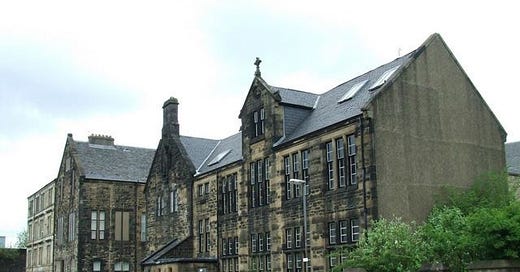Conversations about Scottish Sub-Cultures #1 : with "Drew"
Does Sectarianism still exist in Scotland? If so, how is it changing? Here are (suitably anonymised) transcripts of some of the ordinary Scottish people I interviewed 12 years ago.
I enjoy interviewing people about their opinions at first hand, and I undertook this small research project for a not-for-profit organisation for a modest fee. It was a great chance to ask people about their own experiences of Catholic/Protestant relations.
All participants were recruited from social media and took part voluntarily - no remuneration changed hands. None of these interviews have been previously published.
Interview #1 – 21st November 2013 (edited transcript)
On school:
“I went to primary school in Renfrew, St. James’ in Renfrew, and I went to St. Mirin’s Academy in Paisley, which was the Catholic senior secondary school. Boys only school. It was really the senior secondary school for the whole of this area, including Paisley, Johnstone, Elderslie, Barrhead, etc. I always thought the corporal punishment was a bad side, and I think the fact that it was an all boys school, and it was a male environment, because there was one female music teacher, and one secretary. So it was a total male macho thing, in a way. There was a girls’ school across the road from us, and we weren’t allowed to mix. Our two lunch hours were different.”
On work:
“There were always more Protestants. It was never a big thing with me. There were obviously more Protestants employed, but it was never a big issue with me. It was with some folk. I would say [Catholics and Protestants] probably mixed socially, but not to a great deal.”
On the social club he worked as Treasurer for:
“To be a full member, you’ve got to be a Catholic, to be a member of the Knights of St. Colomba, but the associate members can be anything. The Knights side of it’s purely men, but there’s women in the associate members side, and there’s nothing stopping them bringing their families and their kids in. [The club is] mainly used for family parties, weddings, anniversaries, etc., etc. The odd christening. Originally, you would have bingo on a Tuesday night, Saturday and Sunday night you would have groups on, bingo on there as well, but you cannae get folk to support things like that [any more].”
When asked how the Catholic church has maintained congregation numbers:
“I think it’s just historical. I think it just goes down with family. But that’s changing drastically, because you see parents come with their kids on a Sunday, whilst they're still at primary school. Once they hit secondary school you very rarely see the kids. I think membership on the whole, for most organisations, is an ageing thing.”
On Catholic schools:
“The big thing I find now is the schools have changed. When I went to school as a kid, you could never have got into a Catholic primary school unless you had baptismal papers. Now they cannae refuse anybody. And there’s a mix in all the schools, primary and secondary. Even here, there’s one Catholic primary in Renfrew and three non-denominationals, and yet there’s quite a few non-denominational’s that’ll send their kids to a Catholic school. Because I’m not involved, don’t have family or kids, I never realised there’s so many non-Catholics in Catholic schools. It’s quite high a percentage. We were talking last year at one of the first communions – there were three classes in that year at primary school, and I don’t think there were forty kids for first communion. That’s only about fifty percent. So I never realised the figures were anything like that – I don’t know what the figures are like in secondary school, but somebody must have them somewhere.”
On ancestry:
“I don’t consider myself Irish; I’m Scottish. I did have a friend when I was younger, who as far as he was concerned, he was Irish. I said ‘Brendan, you’re born and bred in Scotland’. I still consider myself Scottish first, and British second.”
On sectarianism in the community:
“It’s still there, but it’s getting a lot better. I think you need to be in some of the communities to realise what it’s like. I was getting on the bus the other day, and the driver said ‘I don’t know if I’ll be able to take you [to a certain address] – there’s streets in Glasgow being closed off. There’s a big Orange walk on today. Traffic’s ground to a halt because of the walk.’ I didn’t even think of it.”
Discussing mixed communities in Glasgow:
“The Irish thing will go away. I think it could be replaced by tensions with Muslims, etc., etc. It’s amazing the number of mosques that are about that folk don’t know about. Where I lived when I was at primary school – there used to be four shops around the corner. Two of them are now a funeral parlour, the other two are a mosque.”
On football:
“You see with these ones at the football, and you’ve still got a problem at Celtic Park – when they were going to split them up and move all their seats. Disnae seem to have happened. That crowd think they’re Irish, but they’re not. This is what they cling to. I don’t know why. Their religion is Ibrox or Parkhead. They’re not religious at all.
The other thing I think, is you don’t have as many on the football now, because football’s so expensive, most supporters if they go, they go to the home games, but very few of them go away now.
It’ll take years and years and years to change it. I honestly feel it’ll go back to the bad old days in another two years, when Rangers get back in to the Premier League, if they can sort out their boardroom squabbles.”



